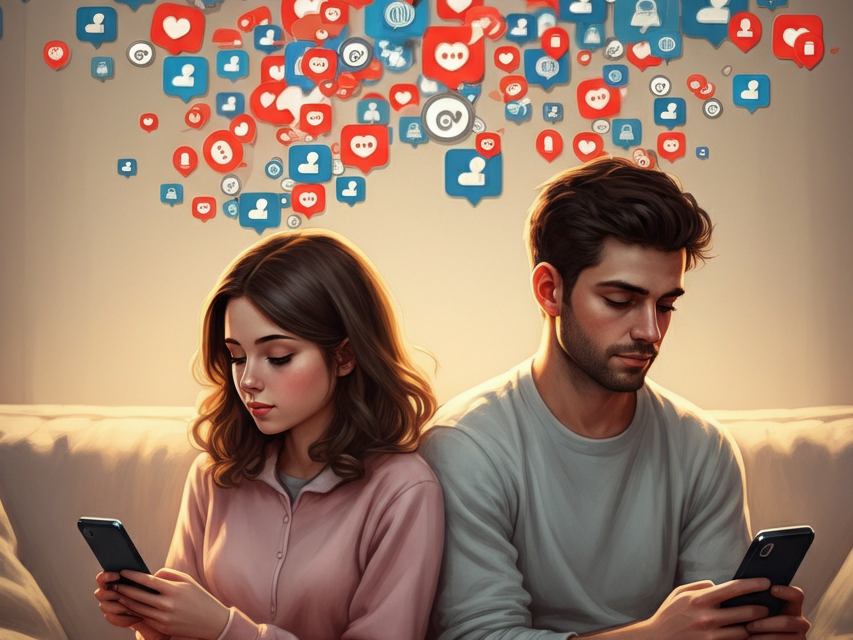Is Social Media Ruining Your Relationship?
Scrolling through picture-perfect couples on social media can make even the happiest relationships feel lacking—discover how social comparison theory explains these feelings and get practical tips to protect your love life from the pitfalls of online comparison.

Ever found yourself scrolling through Instagram, only to suddenly feel like your relationship just doesn’t measure up? You’re not alone. Social media is packed with picture-perfect couples, surprise getaways, and grand romantic gestures—making real love stories feel a little less exciting by comparison. But what if those endless highlight reels are quietly chipping away at your happiness together?
Social media has reshaped nearly every aspect of our lives, from the way we connect with friends to how we communicate with our significant others. But as we scroll through curated feeds, viral TikToks, and polished selfies, one question lingers for many of us, especially those in relationships—is social media silently sabotaging our love lives? The answer often lies in how social media triggers constant comparisons, invites scrutiny, and fuels insecurities.
Through the lens of social comparison theory, this post explores how social media impacts relationships, offering insights into its effects and actionable strategies to build healthier connections.
Understanding Social Comparison Theory
At its core, social comparison theory (Festinger, 1954) explains our inherent drive to evaluate ourselves in relation to others. Whether it’s physical attractiveness, career success, or happiness, we instinctively compare our lives to those around us to measure where we stand.
On social media, this natural tendency becomes magnified. Platforms like Instagram or TikTok showcase highlight reels, where people share their best moments and omit the struggles behind the scenes. This selective presentation invites users to constantly compare themselves to unattainable ideals, fostering feelings of insecurity and dissatisfaction.
The Role of Upward Social Comparison
On social media, upward social comparison occurs when individuals compare themselves to others whom they perceive as being “better” in some way. A study by Vogel et al. (2014) found that frequent exposure to idealized representations of life on social media often results in lower self-esteem.
Now imagine this within the dynamic of a romantic relationship. One partner might see influencers or friends seemingly living perfect lives and start to feel inferior or that their own relationship is lacking. They might think, “Why doesn’t my partner surprise me with romantic getaways like that?” or “Why don’t we look as happy as that #couplegoals picture?”
Real-Life Impact
Consider this scenario: Sarah constantly sees her friends posting photos of their partners giving them extravagant gifts or planning elaborate date nights. Meanwhile, her relationship with her partner, Alex, is much simpler. Over time, Sarah begins to question Alex’s efforts and feels dissatisfied with their relationship, even though there’s nothing inherently wrong with it. This is a classic example of how upward social comparison fueled by social media can damage a relationship.
When one or both partners engage in upward comparisons, it creates insecurity, jealousy, or resentment. These feelings can lead to decreased trust, communication breakdowns, and ultimately, reduced relationship satisfaction (Medical News Today; Choosing Therapy).
Downward Social Comparison
Though less discussed, downward social comparison on social media can also have negative consequences. This happens when individuals compare their lives to others in a way that makes them feel superior.
For instance, someone in a relationship might feel validated when they come across posts about other couples’ arguments or public breakups. While this might boost self-esteem temporarily, it can also breed arrogance, complacency, or even an unrealistic sense of superiority in their own relationship.
Over time, these feelings can erode genuine empathy between partners, making it harder to address real issues when they arise (Frontiers in Psychology).
The Rise of Toxic Social Media Influencers
Another layer comes in the form of influencers. While some use their platforms to spread positivity, others offer advice that is damaging to relationships. Influencers feeding toxic narratives about what “perfect” love should look like may slowly infiltrate people’s minds, setting unrealistic expectations for their partners. Statements like “If they really cared, they’d post you on their feed” or “If they don’t buy you luxury gifts, they don’t value you” can create unnecessary pressure in relationships.
These toxic ideals, when internalized, can lead to constant comparisons, fueled arguments, and anxiety about meeting what is often an impractical standard (Mind Body Counseling Reno).
Strategies to Mitigate Social Media’s Negative Effects
The good news is that social media doesn’t have to destroy relationships. With mindfulness and intentional habits, it’s possible to use social media while fostering trust and satisfaction in your relationship. Here are practical strategies to protect your love life from the harmful effects of social media comparison:
- Limit Screen Time
Spending excessive time on social media can magnify feelings of inadequacy and dissatisfaction. Set boundaries like limiting your scrolling time and prioritizing face-to-face connection with your partner instead (Medical News Today). - Practice Gratitude
Instead of focusing on what your relationship lacks, take time to appreciate what makes it special. Small rituals, like sharing daily gratitude with your partner, can reinforce positive feelings and counteract the influence of comparison. - Avoid Toxic Accounts
Unfollow influencers or accounts that promote unrealistic expectations. Instead, follow creators who share authentic content about relationships and self-growth. - Communicate Openly
If social media is causing jealousy or insecurity, talk to your partner about it. Open communication can help both of you understand each other’s feelings and work together to address issues (Choosing Therapy). - Take Social Media ‘Breaks’
Consider scheduling regular detoxes from social media as a couple. Use this time to connect deeply without distractions, whether it’s a weekend getaway or simply cooking dinner together. - Focus on Genuine Connections
Join communities or groups that encourage meaningful engagement rather than comparison. For example, participate in forums, local meetups, or even online counseling centered on improving relationships.
How to Build a Stronger Relationship in the Digital Age
While social media can amplify feelings of envy or jealousy, it’s possible to reclaim its role in your life and relationships for good. Use it as a tool for inspiration, connection, and learning, rather than a measuring stick for your worth or love life.
Consider reflecting on your social media habits. Ask yourself, “How do my online interactions make me feel about my relationship?” If the answer leans negative, consider implementing intentional changes.
For those finding it difficult to maintain a healthy balance, couples therapy might help uncover underlying insecurities brought on by social media. At the very least, it can open a productive dialogue between partners.
You’ve taken the first step by educating yourself on social media and relationships. Keep the momentum going. Subscribe to our newsletter for more relationship tips, take our free quiz to assess the impact of social media on your relationship, or share your own experiences in the comments below.
References
Cunningham, S. (2021). Social media social comparison and self-esteem [PDF]. BYU ScholarsArchive. https://scholarsarchive.byu.edu/cgi/viewcontent.cgi?article=7927&context=etd
Frontiers in Psychology. (2017). The mediating roles of upward social comparison and self-esteem. Frontiers in Psychology, 8, Article 1291638. https://www.frontiersin.org/journals/psychology/articles/10.3389/fpsyg.2024.1291638/full
Manoshala. (2024). How social media impacts romantic relationships: The positive and negative sides. https://manoshala.com/blogs/manoshala-blog/how-social-media-impacts-romantic-relationships-the-positive-and-negative-sides
Medical News Today. (2024). How does social media affect relationships? https://www.medicalnewstoday.com/articles/social-media-and-relationships
Mind Body Counseling Reno. (2023). How social media affects relationships in modern times. https://mindbodycounselingreno.com/blog/relationships/how-social-media-affects-relationships/
Palmer Christensen, S. (2018). Social media use and its impact on relationships and emotions [PDF]. BYU ScholarsArchive. https://scholarsarchive.byu.edu/cgi/viewcontent.cgi?article=7927&context=etd
Psych Central. (n.d.). Is social media toxic or healthy for relationships? https://psychcentral.com/relationships/is-social-media-toxic-or-healthy-for-relationships
SHS Web of Conferences. (2024). Social comparison on social media platforms. SHS Web of Conferences, 183, 03008. https://www.shs-conferences.org/articles/shsconf/pdf/2024/05/shsconf_iclcc2024_03008.pdf
Vogel, E. A., Rose, J. P., Roberts, L. R., & Eckles, K. (2014). Social comparison, social media, and self-esteem. Psychology of Popular Media Culture, 3(4), 206–222. https://doi.org/10.1037/ppm0000047

